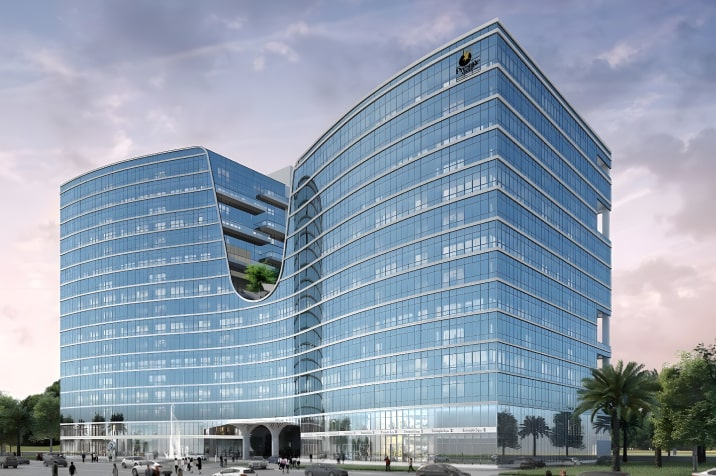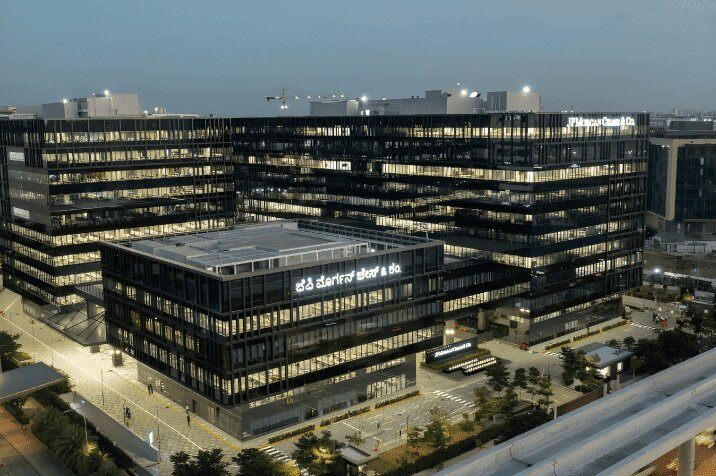
Technology MNC Building in Bangalore
The Building
2018-19, Indian subsidiary of Technology MNC was all set to finalize its large office in Bangalore India. The internet giant had signed a deal with one of the large Bangalore based builder – Bagmane group. The building was Bagmane KYOTO east tower strategically located on off-outer ring road – Mahadevapura and offered tastefully designed office space. The building is Grade A USGBC gold certified LEED building and encompasses a total build up area of 0.45 Mn sqft, spread over GF + 9 floors.
The Need
The project’s large scale, combined with the desire for welcoming spaces within the overall framework, was a defining challenge for the design team. To make the most of the building’s glass facade and abundant natural light, the need of integrated lighting control with daylight harvesting by drawing natural light deep into the space while mitigating heat gain and glare. Apart from use of standard strategies of lighting control, seamless integration of VAVs with lighting control sensors was required to save potentially large amount of energy. The system also needed to easily accommodate changes to layout and programming over time continuing to deliver cutting-edge performance for years to come. Wireless devices which could achieve this were desired.
Finally, the project had to be completed on time and budget, no small ask during a global manufacturing supply-chain & covid 19 crisis.
The Solution
The Commercial Building LMS Controls Standards were prepared to provide performance based minimum guidance about design, installation andmaintenance of Lighting controls systems installed to a Google Kyoto East Bangalore space which is controlled by a Lutron’s Lighting ControlSystem (LCS).
ILutron’s Dali system digitally addressable dimming ballasts communicate with daylight sensors to automatically adjust electric lights in response to available daylight. Occupancy/vacancy sensors and personal controls are installed throughout the space to ensure that lights are not left on when an area is vacant, but tenants still have control over the lights in their space. The occupancy sensors were seamlessly integrated with VAVs to minimize the time of closer (upto 90%) of VAV damper to save HVAC energy. Finally, a Lutron Quantum Total Light Management system provides centralized control of all lights, and utilizes Quantum Vue software to evaluate, monitor, and communicate energy use.

The control strategies are as follows, Most of the strategies are self-explainable. Additionally, strategy of System integration included seamless BTL certified BACnet integration of Lutron’s native BACnet enabled processor with BMS (Building Management System). The main intent was to integrated the VAVs which controls the airflow to maintain the sensible load. However, VAV traditionally works on temperature function, which generally takes 10-20 mins time for damper to close to minimum set point. With integration with occupancy sensor, this time was reduced to sensor unoccupied status, conserving a relatively large amount of HVAC energy.
Area wise strategy WORKSTATION (OPEN OFFICE AREA):

The entire Workstation area Lighting is designed for Dali Lighting luminaires. When no occupancy is detected for 5 mins through Occupancy sensors, luminaires connected to the respective sensor footprints will be switched off. Luminaires in this area will automatically dim up & down based on the daylight availability through Daylight sensors.

2 Pax Rooms, Pac Rooms Phone Booths, Collab Repro Area, Wellness Rooms/ Multipurpose Room, Concierge Room, Interview Rooms, Informal Rooms, War Room, Security Office, Luggage Rooms, Dns Room, Bms Rooms, Idf & Mdf Rooms, Dishwash, Mothers Room, Stores (Closed Room & Away From Facade):
The area Lighting is designed for Dali Lighting luminaires. When no occupancy is detected for 5 mins through Occupancy sensors, luminaires connected to the respective sensor footprints will be switched off. Luminaires in this area can dimmed up & down based on the Scenes assigned through Wireless keypads.

4 Pax – 14 Pax Rooms, Large Conference Rooms, Tech Talk Rooms (Closed Rooms):
The area Lighting is designed for Dali Lighting luminaires. When no occupancy is detected for 5mins through Occupancy sensors, luminaires
connected to the respective sensor footprints will be switched off. Luminaires in this area can dimmed up & down based on the Scenes assigned
through Wireless keypads.

Cafeteria, Reception, Security Lobbies, Social Hub, Micro-Kitchen, Fitness Studio, Fm Office, Clinic, Meditation Room, Music Rooms (Closed Rooms):
The area Lighting is designed for Dali Lighting luminaires. When no occupancy is detected for 5mins through Occupancy sensors, luminaires connected to the respective sensor footprints will be switched off. Luminaires in this area can dimmed up & down based on the Scenes assigned through Wireless keypads.
The Result
Only with implementation of lighting control strategy (wo VAV integration), over 70% of energy savings were achieved, which on absolute terms was over 100 MWH saved each month w.r.t installed load. Additionally, HVAC integration potentially saved 3.5KWH/SQFT. Some of the graphics (Screen shot of GUI) as under :



Service, Support, and Success
Beyond system design and installation, success depends on getting the right service and support. Lutron’s 65+ years of expertise and commitment to caring for the customer were critical to Google’s confidence in choosing Lutron for the project.
In addition, with the GUI, the Google facilities team are able to monitor, measure and change settings on their own such as reducing the length of time-outs, without having to consult manufacturer. More important, though, is the reaction from the employees. One of the primary reasons for going with LCS is to provide the right environment for his workers. Occupant comfort is paramount to delivering the right environment. Lutron integrated LCS solutions automatically adjust to help create a vibrant, inspiring workspace while saving as much energy as possible.
Schedule a Consultation and Let us Assist you in Determining the Best Solutions for Your Project.
Our seasoned team is eager to engage with your vision, understand your unique requirements, and embark on a tailor made project that exceeds your expectations.

